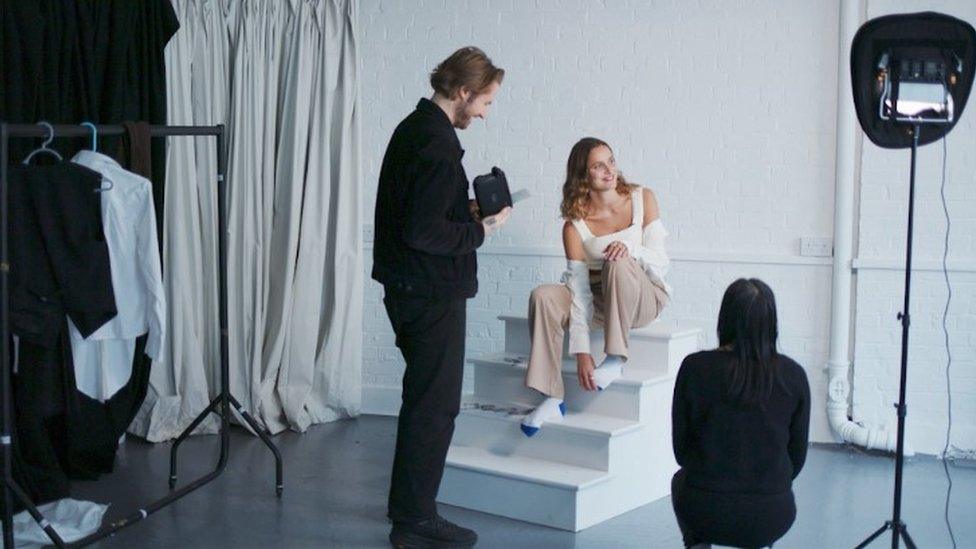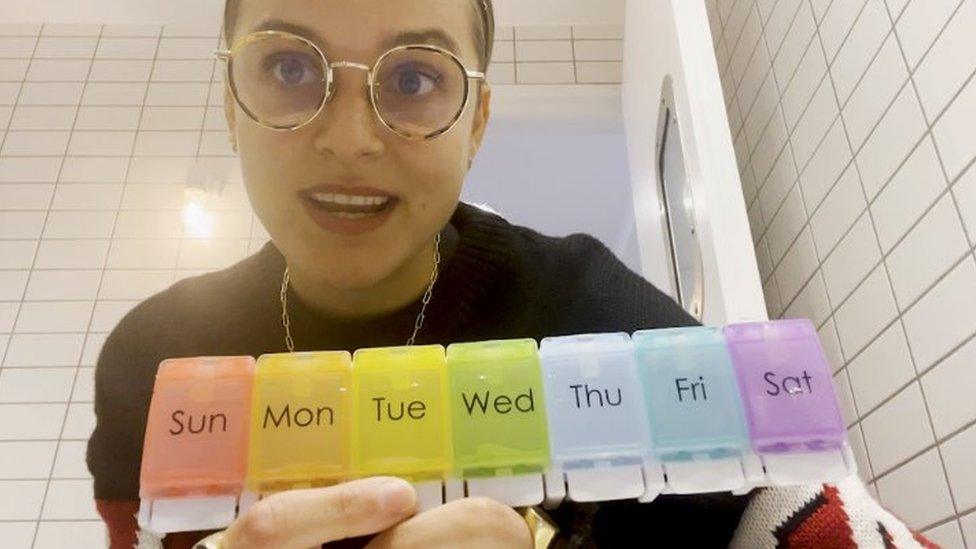Bipolar Disorder: 'I hit the fire alarm and evacuated an airport'
- Published

Fashion model Rosie Viva was diagnosed with bipolar disorder aged 22, after she caused Stansted Airport to evacuate all its waiting passengers.
Rosie hadn't slept all night. She was excited about flying to Croatia to meet her parents for a holiday. Sleep had remained elusive since a recent break-up up with her boyfriend. Despite this, she felt oddly on top of the world.
At 01:00 she decided to go on a run through London. Come the morning, having still not slept, she headed for the airport believing she was in a dream.
She kissed a stranger in a cafe, stole from shops and bought everyone breakfast in McDonald's.
"I honestly thought, 'this isn't real life'," Rosie told the BBC Access All podcast.
She was hyper-alert. Her eyesight and hearing were clearer than ever and she felt her heartbeat "sounded like the end of a concert" it was so loud.
At Stansted Airport, Rosie started to question what she was experiencing and had the sudden urge to phone her mum.
"When she answered, it shattered the illusion," Rosie says. "I realised that it was real life and I had reached breaking point. I felt such a sense of panic."
Rosie looked around and saw a hole in the wall and bolted towards it.
"I jumped through the baggage drop-off. There was a fire alarm on the left-hand side and I just remember hitting that with my hand.
"All I remember is hearing alarms go off and seeing policemen running towards me."
The policemen reached Rosie as the rest of the airport was being evacuated. They quickly realised she needed to go to hospital and had been hallucinating.
Though their arrival could have been distressing, Rosie says: "I just remember a weird moment of relief that I was getting help."

Rosie hadn't felt right for a long time and her reactions to events always seemed more "extreme" when compared to her friends.

"If something really small upset me, I would have three weeks of depression which just didn't add up," she says. At others times she couldn't go to work "because a boy ghosted me", but she didn't know why she reacted this way when others didn't.
She had visited her doctor several times but didn't know how to articulate what she was experiencing, and the support she received never quite helped.
That break-up with her boyfriend had been one of the first signs something was seriously wrong. Rather than feeling devastated, Rosie felt jubilant and energised. Her friends assumed she must be trying to cover up her heartbreak.
Then, in Rosie's words, her language and thoughts turned "super spiritual and religious".
"My parents lost a son to leukaemia when he was seven years old and I'd started sharing online that I felt I was a reincarnation of him."
This would later become an important indicator that Rosie was in a manic state. Coupled with a lack of sleep, Rosie was experiencing psychosis where she saw and heard things that were not there.

After the Stansted incident, an ambulance took Rosie to A&E where she spent the next 24 hours. Her older sister was by her side and her mum had flown back from Croatia.
"I was having moments where I understood what was going on," Rosie says. "But then I'd say things like 'Is it ok if I go on holiday?'"
A bed was found for her in a psychiatric ward and she was sectioned under the Mental Health Act, to ensure she was safe and received the right treatment. She would stay as an inpatient for the next three months.
"I have moments where I remember bits of it," she says. "I just basically didn't sleep for another two months. That level of psychosis was just bizarre because I really didn't recognise my parents for about two weeks.
"I can't verbalise how that felt - to be locked in a room because of the way your mind thinks."
Within a couple of days of being on the ward, Rosie was diagnosed with Type 1 Bipolar Disorder.
She says it took about six weeks for her new anti-psychotic medication to kick-in and to understand what the diagnosis meant.
According to the charity Mental Health UK, Type 1 Bipolar Disorder is characterised by at least one episode of extreme highs, known as mania, which will last for more than a week. People will also experience depression between the highs.
Rosie also has "rapid cycling" where she experiences mania followed by episodes of depression multiple times a year. She also says she experiences smaller mood swings which can occur within hours of each other.
It is a life-long illness which can be managed with various treatments including medication.
"There's no manual," Rosie says and manages it as best she can. "I honestly take my medication religiously and I've come to accept that is what I want to do for the rest of my life.
"Now if something upsets me and I go into a low I wouldn't say my medication cures the depression, it just makes me slightly more rational."
After being discharged from hospital, Rosie was also offered three years of out-patient support through the NHS, to work out a management plan around diet and exercise.

Rosie finds she "thrives" when she eats well, drinks little alcohol and has a good sleep routine. Running has also become her "happy place", which helps to burn off excess energy, in a way relaxing exercises like yoga, don't.
Going for a walk "without my phone and listening to the sounds of the world" has also become key in Rosie finding perspective during challenging moments.
She has made a film about her experience - Modelling, Mania and Me - for Channel 4's Shot By You series, which is a raw insight into her life with bipolar.
"It was a release I'd never had before," she says. "It almost felt like talking to a therapist or a friend."
It has been four years since the incident at Stansted Airport, and Rosie has learned to live with the condition alongside her career as a model for big brands such as Gucci and Yves Saint Laurent. She has also become an ambassador for Bipolar UK.
"I still am such a normal 27-year-old who thinks 'how do I deal with this on top of everything else?'. It doesn't get easier, it's just your mindset towards it gets much kinder."
You can listen to the podcast and find information and support on the Access All homepage.
